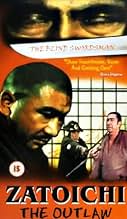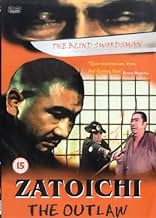NOTE IMDb
7,0/10
1,4 k
MA NOTE
Ajouter une intrigue dans votre langueIn a town where debt-ridden peasants are being ruthlessly exploited, Zatoichi is forced to take sides between a cruel yakuza boss and his seemingly altruistic rival.In a town where debt-ridden peasants are being ruthlessly exploited, Zatoichi is forced to take sides between a cruel yakuza boss and his seemingly altruistic rival.In a town where debt-ridden peasants are being ruthlessly exploited, Zatoichi is forced to take sides between a cruel yakuza boss and his seemingly altruistic rival.
Kô Nishimura
- Kyushiro Suga
- (as Akira Nishimura)
Yûko Hamada
- Oshino
- (as Yuko Hamada)
Histoire
Le saviez-vous
- AnecdotesThe first Zatôichi film produced by Katsu Productions (Shintarô Katsu's own company).
- ConnexionsFollowed by La Légende de Zatoïchi : Route sanglante (1967)
Commentaire à la une
Zatoichi the Outlaw is the sixteenth entry in the franchise about the blind masseur, skilled swordsman and lowly yakuza. It's also the first film to be produced by Katsu Productions, lead actor's Katsu Shintaro's own company. The movie remains faithful to the franchise's typical storytelling of the main character traveling across rural Japan during the shogunate's final years in mid-nineteenth century in order to support the helpless in their struggles with exploitative authorities. However, there are also a few new elements such as more explicit fight scenes with severed limbs and fake blood. The plot is also more complex and epic than usual. To keep it short, Zatoichi travels to a town led by a sword-less ronin who leads a peasant movement advocating the abstention from drinking, gambling and whoring and teaching how to cultivate rice more efficiently. This ronin is supported by a seemingly honest yakuza and boss who appears to be very close to local farmers. However, another boss who is backed up by a corrupt government official has interest in making money as he organizes a festival promoting the use of alcohol, indepts young peasants by making them participate in crooked gambling and establishes a new brothel. Zatoichi gets caught in between the opposing parties and decides to help the sword-less ronin and the honest yakuza boss. He accidentally kills a peasant that was sent to attack him and injures another. When the corrupt boss confronts him, Zatoichi kills him and goes into hiding. However, Zatoichi soon realizes that his actions have changed things for the worse. The dead peasant's sister is abused by the corrupt government official and then forced into prostitution. The injured peasant is obsessed with killing Zatoichi. The honest yakuza has taken the dead boss' place and has been corrupted by greed and power. The sword-less ronin gets is accused of treason and gets imprisoned. One year after he left the village, Zatoichi is back to repair his mistakes by using his sword.
Even though several critics had a negative perception of Zatoichi the Outlaw, I happen to think it's one of the best entries in the franchise. First of all, the camera work is splendid. It's calm, focused and precise and the landscapes are even more colorful than usual. The score is dramatic and adds a solid dose of intensity to the film. The numerous characters are intriguing and have depth, especially since a lot of them are going through profound and at times unpredictable changes. The movie also has a more ideologiocal and philosophical note as the sword-less ronin tries to organize collective farming and suggest Zatoichi to lay down his sword. This movie almost has a socialist message which is quite interesting. The fight sequences are more intense as well thanks to more explicit scenes with torn hands and heads and the use of fake blood. It makes the brief fights more realistic.
However, the film has a few minor flaws. Even though new writers and even a new director were hired for this film, the plot is still mostly predictable. Also, there aren't many sword fights and the few that are shown aren't as skillful as one is used to. The fights are more brutal and realistic but less artistic and dynamic, taking away from the charme of the series.
In the end, Zatoichi the Outlaw is still a highlight of the Zatoichi franchise in my book. The great acting performances, progressive ideologies and epic plot make this film stand out for fans of old date and new ones alike. Ignore the negative reviews and give it a try!
Even though several critics had a negative perception of Zatoichi the Outlaw, I happen to think it's one of the best entries in the franchise. First of all, the camera work is splendid. It's calm, focused and precise and the landscapes are even more colorful than usual. The score is dramatic and adds a solid dose of intensity to the film. The numerous characters are intriguing and have depth, especially since a lot of them are going through profound and at times unpredictable changes. The movie also has a more ideologiocal and philosophical note as the sword-less ronin tries to organize collective farming and suggest Zatoichi to lay down his sword. This movie almost has a socialist message which is quite interesting. The fight sequences are more intense as well thanks to more explicit scenes with torn hands and heads and the use of fake blood. It makes the brief fights more realistic.
However, the film has a few minor flaws. Even though new writers and even a new director were hired for this film, the plot is still mostly predictable. Also, there aren't many sword fights and the few that are shown aren't as skillful as one is used to. The fights are more brutal and realistic but less artistic and dynamic, taking away from the charme of the series.
In the end, Zatoichi the Outlaw is still a highlight of the Zatoichi franchise in my book. The great acting performances, progressive ideologies and epic plot make this film stand out for fans of old date and new ones alike. Ignore the negative reviews and give it a try!
Meilleurs choix
Connectez-vous pour évaluer et suivre la liste de favoris afin de recevoir des recommandations personnalisées
- How long is Zatoichi the Outlaw?Alimenté par Alexa
Détails
- Durée1 heure 36 minutes
- Rapport de forme
- 2.35 : 1
Contribuer à cette page
Suggérer une modification ou ajouter du contenu manquant

Lacune principale
By what name was Zatôichi rôyaburi (1967) officially released in India in English?
Répondre


































